#but your fantasy’s a prison and you’re serving a sentence you can’t stop repeating
Text







Dear Reader, burn all the files, desert all your past lives and if you don’t recognize yourself that means you did it right.
Never take advice from someone who’s falling apart.
The greatest of luxuries is your secrets.
“There’s no blood on my hands. I just do as I’m told.”
And I saw an Angel come down unto me
In her hand she holds the very key: words of compassion, words of peace
And we lay down on the sand of the sea
And in the distance, six others will curse me
But that’s alright, for I will watch them fall
My little Underground
I’ll be where you can’t see
Somewhere that no one knows
You never refuse when she lies back
She’s on the evening news and if you dare step out of line, you’re going to be abused. Hell has no fury like a young girl’s ego.
(The next song, fly or die, also had the lyrics “it won’t be long til you see me on the news”)
But if police are after you, where’s the best place to hide?
In the middle of the night, I call your name
silent confessing (she did the thing with the changing of the music again)
Viral mess turned dreams into an empire
The hungry patrons hit the graveyard, I lit a joint in the house
Where there was nothing but our mattress.
But your fantasy's a prison and you're serving a sentence you can't stop repeating. You'll only got through the doorway when you relinquish your “possessions”.
So leave everything you've stolen that you can't give back.
“I would do whatever you wanted me to. “
What’s too painful to remember we simply choose to forget.
I’m gonna let y’all solve that
Is it getting heavy? Cause I thought it was already as heavy as can be



0 notes
Text
they sent you shivering to my doorstep, gently clawing at my window when i was less than awake, i slid it up for you to slither through and heard you howling
‘just take me, just take me...!’
#can you see the secret exit? the false wall in obsession?#truly the antlers mwY and belle and sebastian are my fav artists ever no one Gets it like them#the antlers#familiars#revisited#2014#music#indie#folk#not to post the whole song in the tags but OOOOOFFF#the place you’re stubbornly protecting is the only pretty thing that we own now#and we can stay here to wither in your garden of eden#but your fantasy’s a prison and you’re serving a sentence you can’t stop repeating#LIKE HELLO? HELLO??
5 notes
·
View notes
Text
The Eternal Problem: A Meditation on Mortality in Sherlock S4

When asked about S4 during the promotional lead-up, Moftiss repeatedly said this new series would be about one thing: consequences. Now that we stand on the other side of S4, what do we think they meant? It obviously wasn't legal consequences for shooting Magnussen, or physical consequences of overdosing on drugs.
In this meta, I argue that TAB and S4 are above all about the moral, metaphysical, and narrative consequences of Sherlock faking his death during the Reichenbach Fall—an act which continues to reverberate through the story two series later, both for the characters and, significantly, for the writers.
Reichenbach Revisited
First, a little review session: What exactly was the "final problem"?
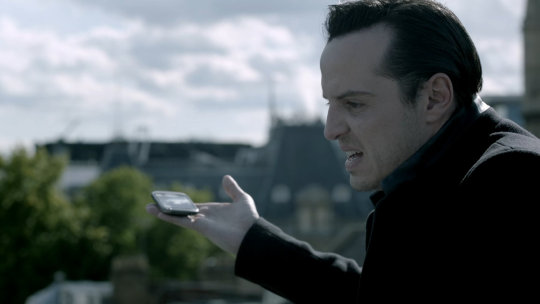
Ah. Here we are at last—you and me, Sherlock, and our problem—the final problem. Stayin’ alive! It’s so boring, isn’t it? It’s just ... staying.
We got an answer, but it was hard to grasp without a larger context. How is staying alive a problem? It is only in the context of Series 4 that the full meaning and extent of Moriarty's final problem starts to become apparent.
Moriarty was sick of staying alive, and he wanted Sherlock to feel the same way. It wasn't enough for Moriarty merely to kill Sherlock (which he could have done at any point on that rooftop)—he needed Sherlock to welcome death, just as he did.
Moriarty tried to give Sherlock the perfect motivation and opportunity to kill himself. He went to great pains to threaten Sherlock's best friends, so Sherlock could honorably sacrifice himself for their safety. Moriarty even stepped first into the breach, hopeful that Sherlock would follow him. But Sherlock refused his offer, and wiggled his way out of this pre-ordained death. He survived the fall and persisted in staying alive.
Appointment in Samarra
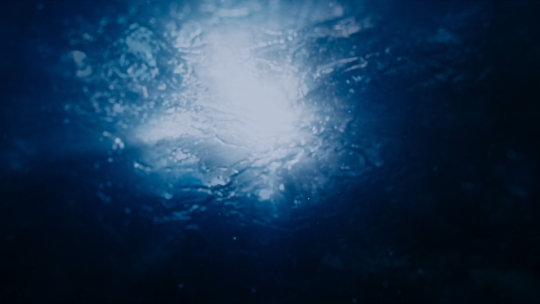
When does the path we walk on lock around our feet? When does the road become a river with only one destination?
The sinister story of The Appointment in Samarra is introduced early in Series 4, and referenced repeatedly in the first episode. Some found this heavy-handed, but it was vital to underline the significance of this fable, because this is the heart of our story -- not just The Six Thatchers, not just Series 4, but the entirety of Sherlock since The Reichenbach Fall.
What happens when someone misses their appointment with Death? Does Death show up at some other moment to claim what it is owed? Or does it pass them by completely?
When Sherlock returns from his faked death, he seems to be at least considering the latter possibility.
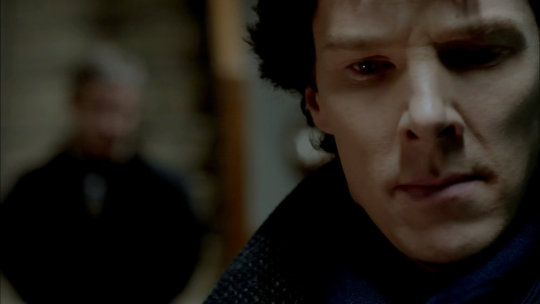
You know my methods, John. I am known to be indestructible.
As time passes, Sherlock appears to be testing his hypothesis by actively courting death. Mary threatens to shoot him if he steps forward, and he does. He accepts Mycroft's promise of a "certain death" assignment in lieu of a prison sentence. He overdoses on the plane in TAB, enough to potentially kill him.
It is during this drug-fueled fantasy that Sherlock starts to wonder why Moriarty was drawn to kill himself, and he himself flirts briefly with the temptations of death.
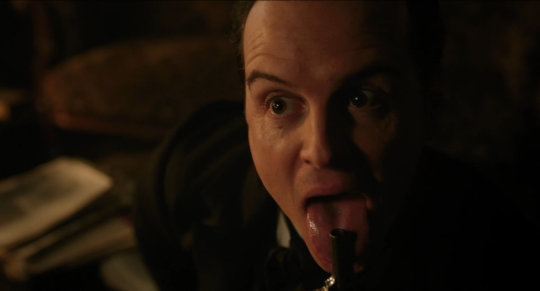
Dead is the new sexy.
But in the end, Sherlock doesn't die.
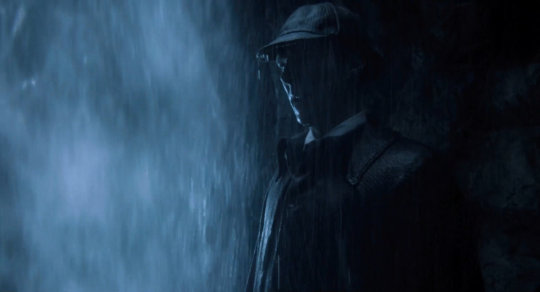
Between you and me, John, I always survive a fall.
He can fall and fall and fall, and he will never land.
Arthur Conan Doyle and the Fandom Problem
The meta-story about Sherlock Holmes's death and rebirth is so often repeated that it has taken on the quality of myth: Doyle hated Sherlock Holmes, he was sick of writing him, so he decided to kill him off once and for all. He even titled his story The Final Problem, for good measure.
We all know what happened next: the fans, to put it mildly, objected. The stories of people dressing in mourning clothes over a fictional character's death may well be apocryphal, but they are nevertheless an important part of how we understand Sherlock Holmes. The fans wouldn't let him die, so Doyle was forced to bring him back from the dead.
Doyle never tried to kill Holmes again, and when he died, other writers took on the project, and in the past hundred years, Sherlock has never stopped being revived.
"There can be no grave for Sherlock Holmes," Vincent Starrett tells us in that famous quotation. It's meant to be reassuring, heart-warming even, but looked at a certain way, it takes on the aura of a threat.
The Final Problem
This, then, becomes The Final Problem, both for Sherlock and for Moftiss. How do you end Sherlock? How do you make him mortal again? Now we see how right Moriarty was: the problem is, in merely "staying alive", Sherlock Holmes becomes inert, stagnant, boring. We don't need him to die, but the audience needs to feel at least that he can die, or all the tension and drama go out of the narrative.
As S4 opens, Sherlock has now walked away from three certain-death situations, and he's a bit giddy.
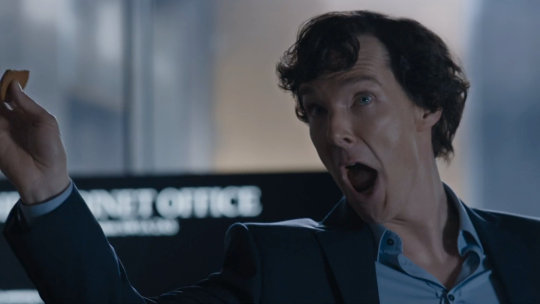
I’m just glad to be alive!!!
But even as Sherlock is gleefully tweeting and solving crimes and petting dogs, living life to the fullest, there's a pall over the episode. He doesn't quite trust his good luck—surely Samarra can't be avoided forever. So when will it catch up to him?
At last, it seems like it's going to.

But Mary gets in the way, sacrificing herself to save Sherlock, and thus perhaps fulfilling her own missed appointment.
At this point, Sherlock starts to realize the downsides to his invulnerability: it only protects him, not those he loves. Nothing he did could protect Mary, because she was destined to die before him.
Premonition and Predestination
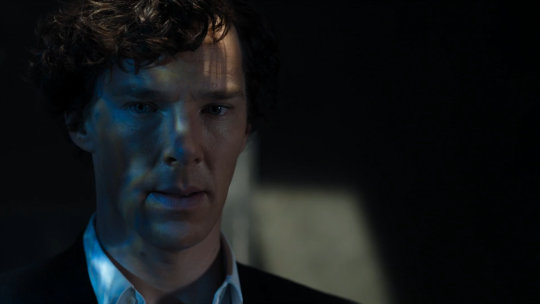
What we call premonition is just movement of the web. If you could attenuate to every strand of quivering data, the future would be entirely calculable, as inevitable as mathematics.
As TST highlights, Appointment in Samarra isn't just about death, it's also about destiny. According to the story, no matter how far you run, you're always exactly where you were meant to be.
Series 4 takes up the idea of predestination repeatedly. In TST, Sherlock appears to be having premonitions—a dalliance with the supernatural almost unheard of in the entire Sherlock Holmes mythos. Sherlock claims to Mary that, given enough information, he can even predict the roll of a dice. This thread is taken up again in The Lying Detective, in which Sherlock is suddenly able to predict (with plausibility-defying accuracy) exactly where everyone will be and what they will do at any given moment.

Really? I correctly anticipated the responses of people I know well to scenarios I devised? Can’t everyone do that?
This preoccupation with predestination serves the narrative, while simultaneously serving as a commentary on the narrative itself. Predestination is a handy metaphor for what it feels like to rewrite someone else's story. BBC Sherlock is fanfic, and in theory it can go wherever it wants, make any changes the writers desire. But even as they make the story their own, we know there are some things Moftiss won't change: the Big Plot Points from ACD they feel obligated to respect. So yes, in a very literal sense, it was predetermined over a hundred years ago that Mary had to die.
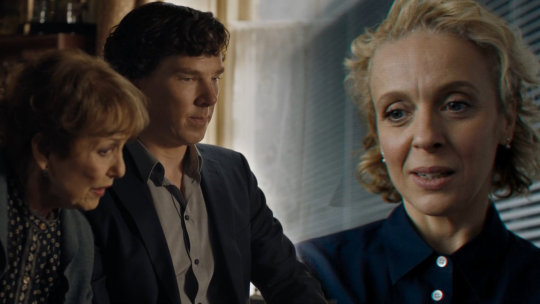
Nothing’s certain; nothing’s written.
But Mary is wrong—her death was indeed written before, and so it had to be written again. Nothing Sherlock did was going to change that. He doesn't need to attenuate to a zillion strands of data, he only needs to follow one to its inevitable conclusion: the narrative. The path that has locked around his feet. Watson in TAB says he always knows when he's in a story; Sherlock is starting to notice the signs as well.
If this is the case, nothing Sherlock does can seriously put his own life at risk. He's the hero, so the narrative will always protect him. But while at the beginning of S4, this idea seemed to thrill him, in TLD he has become much more ambivalent. He cautions "Faith" against suicide, but he also thinks admiringly about Mary sacrificing herself to save him. He goes on a life-threatening drug binge, but doesn't take the idea of his death seriously, despite Molly's chiding. He tells Smith that he doesn't want to die, but he does want Smith to kill him. It's not that he wants to die—he wants to be mortal.
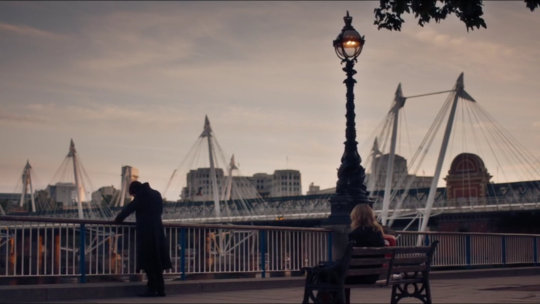
“Taking your own life.” Interesting expression. Taking it from who? Oh, once it’s over, it’s not you who’ll miss it. Your own death is something that happens to everybody else. Your life is not your own.
This is an anti-suicide speech, but in this context it's also kind of a lament. Sherlock does not own his life. Nor do Moftiss. Nor even does Doyle. The fans do—he can only die at their behest, and they will never let that happen.
Meanwhile, Moftiss are expressing the same anxieties about the fate of the narrative. If Sherlock can't die, how do you build to a satisfying, meaningful ending? The show can't go on forever, but its narrative can't be killed, either. The twists get twistier, the cliff-hangers ever more dramatic, the stakes grow higher and higher, but how can any of it ever be resolved?
Samarra, Revisited
The Final Problem is their answer to this question. In interviews since the airing, Moftiss have claimed the key word for the episode was "transgression": TFP goes out of its way to break all the rules of Sherlock. There are no loving shots of London, no text messages floating on the screen. 221b gets blown up, and the rest of the episode takes place in a very blank, artificial, alien environment—more like a stage set than the lived-in world we've come to know. There's no case, no client. Even the Belstaff is missing for much of the episode.
As a result, many fans thought that with TFP, the show had finally gone off the rails—that somehow the writers forgot how to write an episode of Sherlock. But this shift in aesthetic and narrative mode was entirely by design. The writers were deliberately upending everything we know and love about Sherlock in an attempt to convince us that anything was possible, that anyone might die. Even Mycroft. Maybe even Sherlock.
And so, it is in this context that Sherlock makes one last attempt to find Samarra.
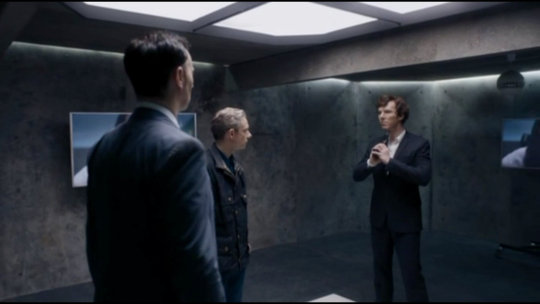
As is only appropriate, it is Moriarty who (from beyond the grave) once again suggests this option.
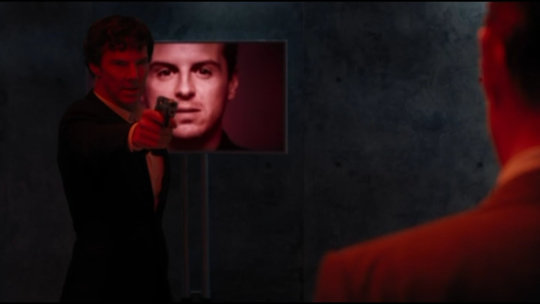
And here we are, at the end of the line. Holmes killing Holmes. This is where I get off.
Up until this point, it seems like Sherlock is planning to kill Mycroft, but here he changes course. It's probably not the locomotive double-entendres that spark his epiphany, so it must be the line "Holmes killing Holmes." Eurus tells us that Jim Moriarty thought Sherlock would make this choice, meaning kill Mycroft. But that doesn't really make sense. When he was alive, Jim never said anything about wanting Sherlock to kill his brother. What Moriarty always wanted was for Sherlock to kill himself.
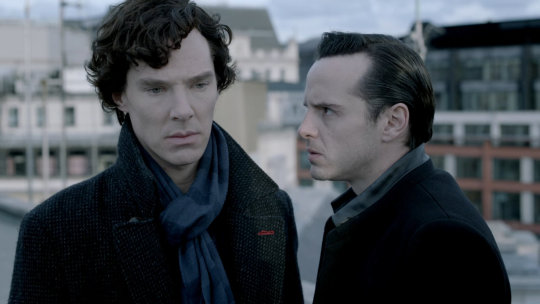
Of course. That’s the point of this.
Suddenly Sherlock realizes that Moriarty's original plan for him is the only way out of his current situation.
And so he "remembers the Governor", who did the one thing Sherlock couldn't do: he killed himself to save someone he loves. Never mind that it doesn't work—that was his appointment in Samarra, and in doing it he atoned for his earlier misdeeds and became a good man. Sherlock missed his appointment, but thanks to Moriarty's hints, he realizes he has a chance to do it over, make it right this time. He must fulfill his destiny and sacrifice himself to save his friends.
Except he can't. It's what Moriarty wanted, his final gift to Sherlock, the solution to their "problem". But Eurus/the narrative/the fans won't let it happen, and Sherlock is saved once again.
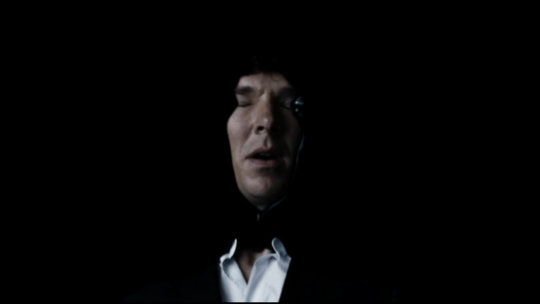
The Eternal Problem
And so the Final Problem remains unsolved, as it always will. The episode wraps up with a kind of coda—not so much an ending as a promise/threat of endless repetition. Again and again, we see Sherlock walk the path to his sister's cell. The flat at 221b Baker Street, which was so dramatically exploded earlier in the episode, is recreated with finicky, almost neurotic precision.
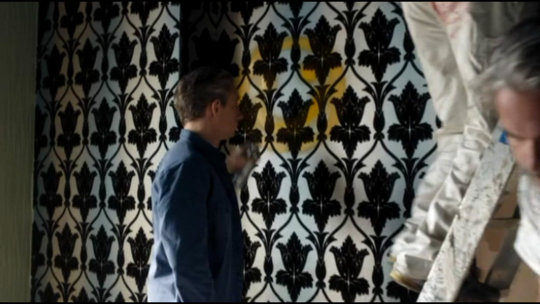
And a montage accompanied by Mary's voice-over reassures us that all our favorite characters will continue on ad infinitum. The idea is comforting and horrifying all at once.
Fans have made much of Lestrade's full-circle assertion that Sherlock is now a "good man", and Moffat has confirmed that the point of the show was to humanize Sherlock.
But this isn't really accurate. From the very first episode, Sherlock was always a deeply human character—that is to say, he was flawed. He was complex. He did good things for bad reasons, and bad things for good reasons. He tried and failed. He was vulnerable and sensitive. He was vain and petty and occasionally cruel, but he was also at times unfathomably kind and empathetic. He inspired loathing in some, but great loyalty and devotion in those who knew him best. He was playful, funny, unpredictable. If he hadn't been all those things—if he had truly been a cold, emotionless machine—he would have been a horrible bore to watch.
The progress of Sherlock Holmes, then, is not from great man to good man, but from a man—a mortal man with weaknesses and flaws—to a mythic hero who is perfectly strong, perfectly wise, perfectly compassionate.
Who you really are, it doesn’t matter. It’s all about the legend, the stories, the adventures. When all else fails, there are two men sitting arguing in a scruffy flat, like they’ve always been there and they always will.
Sherlock Holmes will go on forever, in fanfic and pastiche, in other adaptations, and maybe even under Moftiss's pen. This is how the story is ended, how the "final" problem is solved. Not by killing Sherlock, but by at last submitting to his true, unalterable destiny: Sherlock is fated (or doomed?) to spend all eternity "in a romantic chamber of the heart: in a nostalgic country of the mind: where it is always 1895."
1K notes
·
View notes